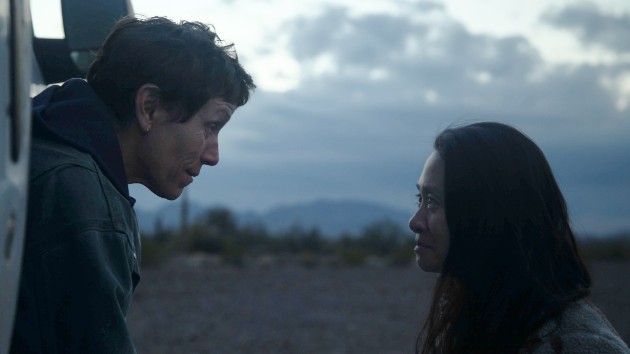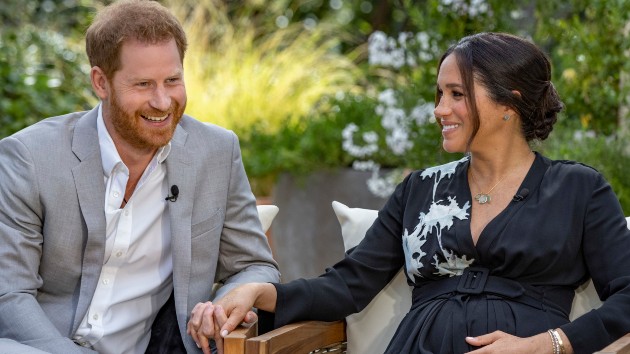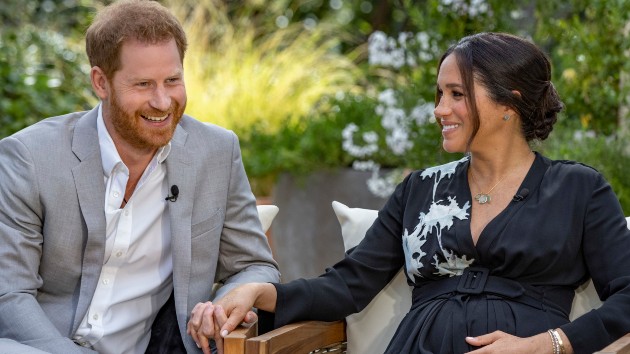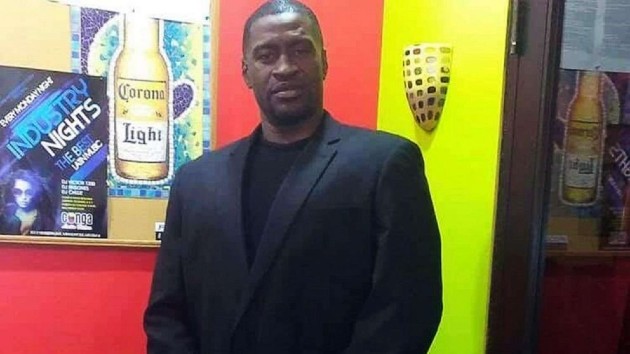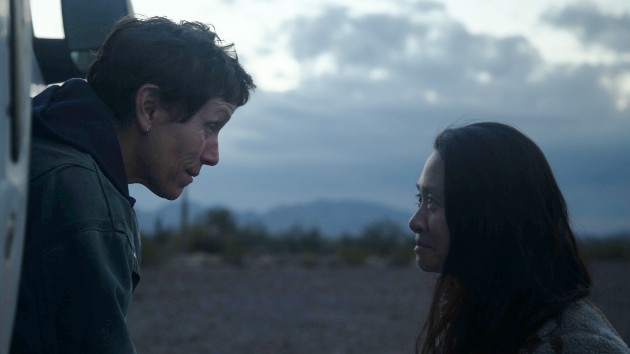 “Nomadland” – L-R – McDormand, Zhao – © 2020 20th Century Studios(LOS ANGELES) — The 26th Annual Critics Choice Awards, hosted for the third time by Taye Diggs, were handed out on Sunday in-person/virtual hybrid ceremony airing live on The CW.
“Nomadland” – L-R – McDormand, Zhao – © 2020 20th Century Studios(LOS ANGELES) — The 26th Annual Critics Choice Awards, hosted for the third time by Taye Diggs, were handed out on Sunday in-person/virtual hybrid ceremony airing live on The CW.
Nomadland topped the winners in the film categories with four awards, including Best Picture, Best Director and Best Adapted Screenplay for Chloé Zhao, who became the first Chinese woman to win as either director or writer.
Ma Rainey’s Black Bottom came in second with three awards, including Best Costume Design, and Best Hair and Makeup and posthumous Best Actor honors for the late Chadwick Boseman.
Boseman’s widow, Taylor Simone Ledward, accepted the award on his behalf, noting, “It is so hard to find a celebratory in these moments.”
“His work in this film deserves this — he deserves this,” she added.
Best Actress honors went to Carey Mulligan for Promising Young Woman, which also earned Emerald Fennell the trophy for Best Original Screenplay. Best Supporting Actor went to Daniel Kaluuya for Judas and the Black Messiah; and Best Supporting Actress to Maria Bakalova for Borat Subsequent Moviefilm.
In the TV categories, The Crown took four categories: Best Drama Series, Best Actor and Actress in a Drama Series for Josh O’Connor and Emma Corrin, respectively; and Best Supporting Actress in a Drama Series for Gillian Anderson.
Ted Lasso was three-for-three in the comedy categories, taking home Best Comedy Series, Best Actor in a Comedy Series for Jason Sudeikis and Best Supporting Actress in a Comedy Series for Hannah Waddingham. The Queen’s Gambit won the award for Best Limited Series; and its female lead, Anya Taylor-Joy, won for Best Actress in a Limited Series or Movie Made for Television.
As previously announced, Zendaya was the recipient of this year’s SeeHer Award, which recognizes a woman who embodies the values set forth by the SeeHer movement, “to push boundaries, defy stereotypes and acknowledge the importance of authentic portrayals of women across the entertainment landscape.”
The complete list of winners is as follows:
FILM CATEGORIES
BEST PICTURE
Nomadland (Searchlight Pictures)
BEST ACTOR
Chadwick Boseman — Ma Rainey’s Black Bottom (Netflix)
BEST ACTRESS
Carey Mulligan — Promising Young Woman (Focus Features)
BEST SUPPORTING ACTOR
Daniel Kaluuya — Judas and the Black Messiah (Warner Bros.)
BEST SUPPORTING ACTRESS
Maria Bakalova — Borat Subsequent Moviefilm (Amazon Studios)
BEST YOUNG ACTOR/ACTRESS
Alan Kim — Minari (A24)
BEST ACTING ENSEMBLE
The Trial of the Chicago 7 (Netflix)
BEST DIRECTOR
Chloé Zhao — Nomadland (Searchlight Pictures)
BEST ORIGINAL SCREENPLAY
Emerald Fennell — Promising Young Woman (Focus Features)
BEST ADAPTED SCREENPLAY
Chloé Zhao — Nomadland (Searchlight Pictures)
BEST CINEMATOGRAPHY
Joshua James Richards — Nomadland (Searchlight Pictures)
BEST PRODUCTION DESIGN
Donald Graham Burt, Jan Pascale — Mank (Netflix)
BEST EDITING — TIE
Alan Baumgarten — The Trial of the Chicago 7 (Netflix)
Mikkel E. G. Nielsen — Sound of Metal (Amazon Studios)
BEST COSTUME DESIGN
Ann Roth — Ma Rainey’s Black Bottom (Netflix)
BEST HAIR AND MAKEUP
Ma Rainey’s Black Bottom (Netflix)
BEST VISUAL EFFECTS
Tenet (Warner Bros.)
BEST COMEDY
Palm Springs (Hulu and NEON)
BEST FOREIGN LANGUAGE FILM
Minari (A24)
BEST SONG
“Speak Now” — One Night in Miami (Amazon Studios)
BEST SCORE
Trent Reznor, Atticus Ross, and Jon Batiste — Soul (Disney)
SERIES CATEGORIES
BEST DRAMA SERIES
The Crown (Netflix)
BEST ACTOR IN A DRAMA SERIES
Josh O’Connor – The Crown (Netflix)
BEST ACTRESS IN A DRAMA SERIES
Emma Corrin — The Crown (Netflix)
BEST SUPPORTING ACTOR IN A DRAMA SERIES
Michael K. Williams — Lovecraft Country (HBO)
BEST SUPPORTING ACTRESS IN A DRAMA SERIES
Gillian Anderson — The Crown (Netflix)
BEST COMEDY SERIES
Ted Lasso (Apple TV+)
BEST ACTOR IN A COMEDY SERIES
Jason Sudeikis — Ted Lasso (Apple TV+)
BEST ACTRESS IN A COMEDY SERIES
Catherine O’Hara — Schitt’s Creek (Pop)
BEST SUPPORTING ACTOR IN A COMEDY SERIES
Daniel Levy — Schitt’s Creek (Pop)
BEST SUPPORTING ACTRESS IN A COMEDY SERIES
Hannah Waddingham — Ted Lasso (Apple TV+)
BEST LIMITED SERIES
The Queen’s Gambit (Netflix)
BEST MOVIE MADE FOR TELEVISION
Hamilton (Disney+)
BEST ACTOR IN A LIMITED SERIES OR MOVIE MADE FOR TELEVISION
John Boyega – Small Axe (Amazon Studios)
BEST ACTRESS IN A LIMITED SERIES OR MOVIE MADE FOR TELEVISION
Anya Taylor-Joy — The Queen’s Gambit (Netflix)
BEST SUPPORTING ACTOR IN A LIMITED SERIES OR MOVIE MADE FOR TELEVISION
Donald Sutherland – The Undoing (HBO)
BEST SUPPORTING ACTRESS IN A LIMITED SERIES OR MOVIE MADE FOR TELEVISION
Uzo Aduba — Mrs. America (FX)
BEST TALK SHOW
Late Night with Seth Meyers (NBC)
BEST COMEDY SPECIAL — TIE
Jerry Seinfeld: 23 Hours to Kill (Netflix)
Michelle Buteau: Welcome to Buteaupia (Netflix)
BEST SHORT FORM SERIES
Better Call Saul: Ethics Training with Kim Wexler (AMC/Youtube)
By George Costantino
Copyright © 2021, ABC Audio. All rights reserved.


